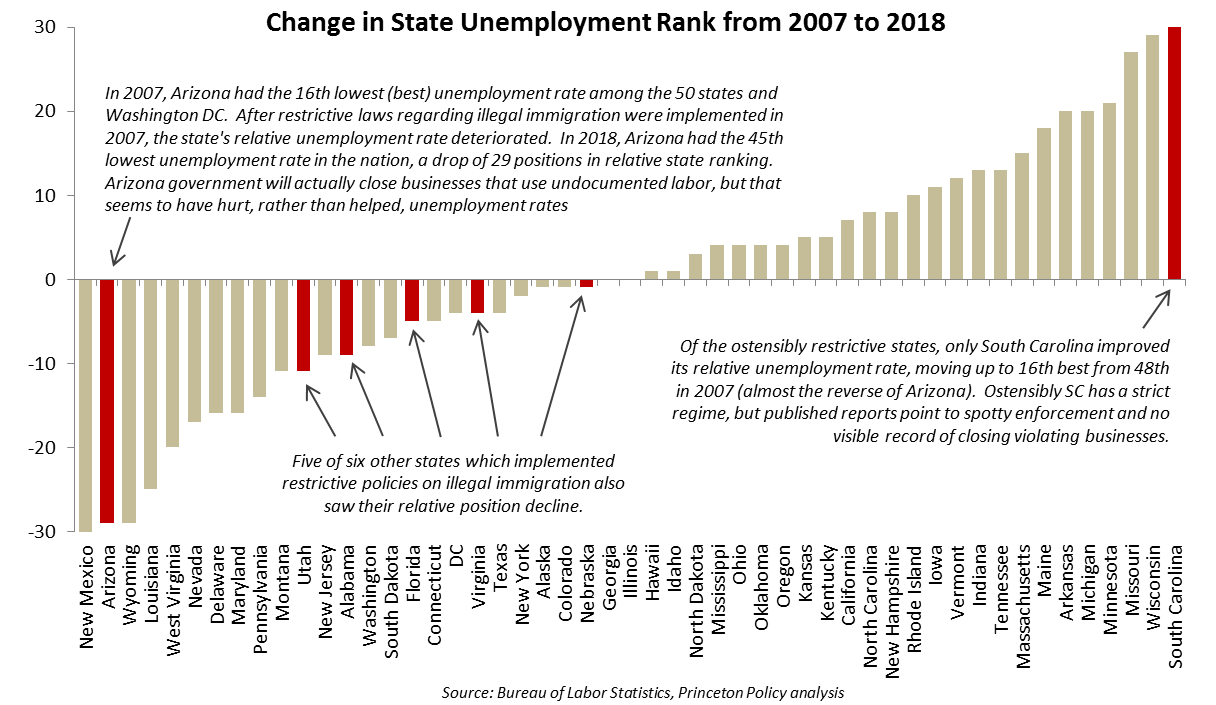Migrant labor constitutes a black market: Central Americans want to sell their labor to US employers; the US government is trying to stop it. This conflict creates a black market in labor. Whether in alcohol, gambling or migrant labor, there are three approaches to try to beat a black market.
Suppress Supply
Without fail, governments try to suppress black markets by focusing on supply, arresting drug dealers or detaining hotel maids and berry pickers attempting to sneak across the US border. Supply suppression is used because it externalizes the problem -- it's the Mexicans' fault! -- and there is nothing more politically expedient than blaming someone else.
Supply suppression has never worked, because enforcement provides the incentive for its own undoing. When supply is suppressed, prices go up and competition goes down. For example, on the coastal areas of the Carolinas, restaurants are so short on labor that they are both cutting hours and increasing wages, up to $16 / hour for unskilled labor. That's 16 times the Honduran wage, the equivalent of paying an American $500,000 to wash dishes in Acapulco. Would there be any shortage of takers, even if they had to cross the border illegally?
Nevertheless, prohibitions are as politically stable as they are socially destructive--because whatever bad is happening can be billed as someone else's fault.
Suppress Demand
Note to conservatives: Suppressing demand actually works. It worked for hard drugs in Japan and Singapore. And for undocumented labor in Arizona. Arizona brought in tough anti-illegal labor laws in 2007 and reduced their undocumented population by half. Not only that, they have kept the numbers down. How? By closing businesses that use undocumented labor.
But is it a good idea? Unlike alcohol -- which was banned during Prohibition -- migrants actually add to GDP. Alcohol today is the third leading cause of preventable death in the US and leads to a loss of $250 bn / year of GDP. By contrast, undocumented migrants directly add $200 bn of GDP in their wages alone and nearly $500 bn in enabled economic activity.
So how did Arizona's enforced prohibition on migrant labor work out? In terms of employment, it's a train wreck.
Back in 2007, Arizona had the 16th best unemployment rate among the states. Today, it's in 45th place -- even worse than perennial laggard Mississippi, for example. In fact, Arizona has the second worse relative record (change in rank) of all the states since 2007. Moreover, six of the seven states which enacted restrictive laws regarding use of undocumented labor have seen their relative rank, in terms of unemployment rate, deteriorate compared to the other states.
Only South Carolina has bucked the trend, and indeed, done so spectacularly, with the most improved unemployment rate since 2007 in the country. But look for enforcement there, and one finds less than enthusiasm: Only 2 percent of businesses in South Carolina were audited in 2017, and 17 percent of that sample were found not to be using the system. None of the scofflaws, however, were fined.
Google can find no mention of the respective South Carolina law in the press in the last five years. Indeed, the only story which turns up is a Republican-backed initiative to provide in-state tuition for long-time South Carolina undocumented residents. So much for conservative resolve.
If conservatives want to take a principled, hard line stance against illegal immigration, then they need to take a hard line against employers using that labor. Conservatives like Dan Bognino or Chris Buskirk should call to shut down meat and poultry processing, much of the dairy business, virtually all US fruit and vegetable production, and half of construction. We import our TVs, why not our meat, fruit and dairy? If you're a conservative -- and you really believe that migrant labor is bad -- then you should go after the employers. Arizona -- and the history of black markets otherwise -- show that it can work.
But it's not free, neither in terms of the economy or national politics.
Legalize and Tax
Once again, the standard prescription for a black market is to legalize and tax it, as we did with alcohol, gambling and now, marijuana. It does not make all the problems go away -- alcohol is still a huge health issue -- but it eliminates the related black market pathology, which is inevitably far worse than the contraband item itself.
Although a legalized system will not end all the problems associated with poor, unskilled Latin American migrants, it can vastly reduce their impact. For example, a market-based system can greatly reduce the number of dependents and effectively end birth tourism (for non-tourist migrants) -- these two items represent the major fiscal burdens of illegals today. And such a system can ensure the US is properly compensated for providing labor market access, instead of being grossly under-compensated as it is today in the current H-2A visa system.
A legalized, market-based system is unambiguously the right approach, and one which could help the Trump administration score some much needed points.
*****
If you want to end illegal immigration, there are three ways to do it: suppress supply, suppress demand or legalize and tax the activity. Suppressing supply, by building a wall for example, is politically attractive but will inevitably result in policy failure. Suppressing demand by shutting down employers will work, but it is not cheap in either financial or political capital. And finally, black markets can be finished by legalizing and taxing the activity. While such an approach will not solve every problem, it will solve most major issues and close the matter from the electorate's perspective, just as we note in our white paper.
